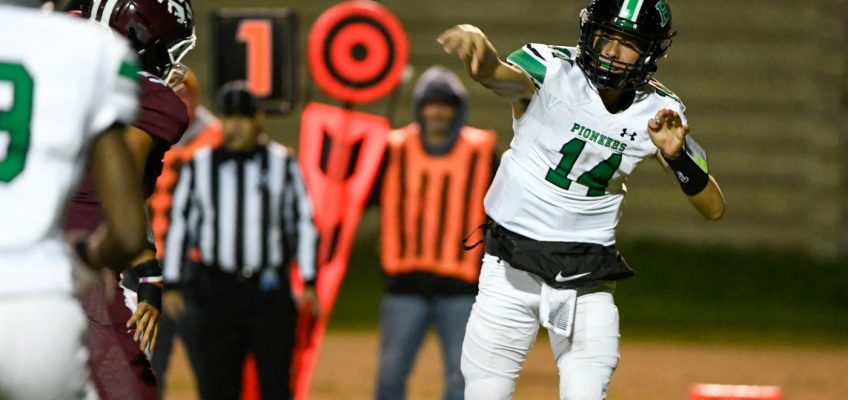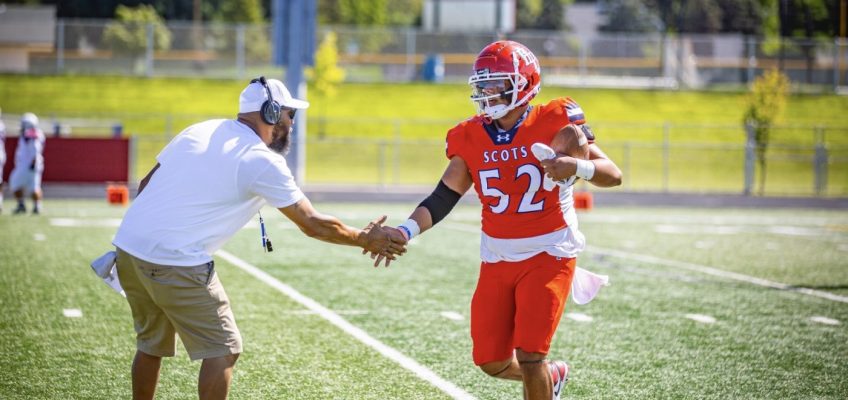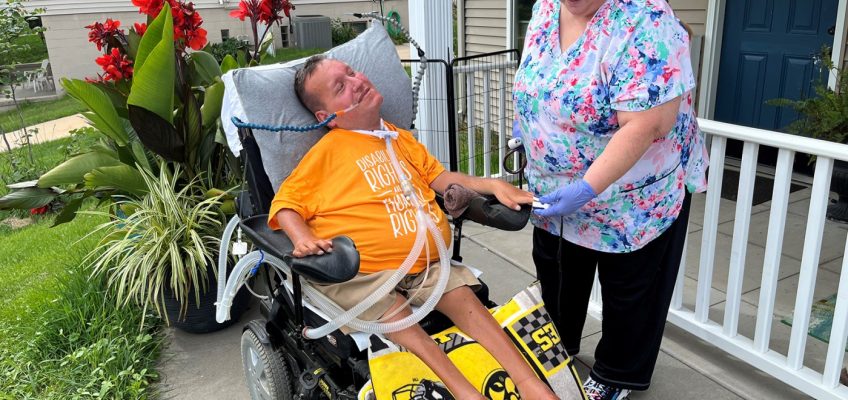Star senior lineman Armando Carroll approached Highland Park coach football Dave Zeitchick last month to inform him he’d need to miss a practice to have a biopsy of a lymph node mass.
“And you’re freaking out like, ‘What’s wrong? What’s going on?’ ” recalled Zeitchick, who is fully aware of Carroll’s recent health history. “And he’s like, ‘Oh, it’s nothing, I’ll be back on Friday.’ ”
Sure enough, he was. If Carroll can be on the field, he will be. That’s true in practice or competition.
Carroll is Highland Park’s starting center on an experienced offensive line that paves the way for the Scots’ ground game. He also is team’s best defensive lineman, one who lived in Johnson’s offensive backfield in the season opener.
Oh, and he also handles the team’s kickoff duties.
“I’m an athlete,” said Carroll, who also plays baseball. “I love playing sports, I love being outside, doing my activities.”
That love was reinforced last year when, for a brief period, it was all taken away.
THE DIAGNOSIS
“My mom is very protective,” Armando said.
So, when Camila Carroll first noticed a lump on the side of her son’s face near his ear in the spring of 2023, she sprung into immediate action. Off to the doctor they went.
The pediatrician referred them to the ear, nose and throat specialist. What followed was an ultrasound, CT scan and then a biopsy, all within a span of weeks. Then came surgery at the end of May.
“Everything went by really fast,” Camila recalled.
The intention of the surgery was to remove one tumor. As the procedure progressed, two more were uncovered. It was cancer, but diagnosing the exact type proved challenging. Results were passed around from the University of Minnesota to Mayo Clinic in Rochester to Seattle.
“That’s what took the longest,” Camila said.
Throughout the process, Zeitchick couldn’t count how many times he texted Armando.
“‘Did you hear? What’s happening? Did you hear?’ ” Zeitchick said. “It was waiting and waiting, and he just went about his business. It seemed like it was weighing on all of us a lot more than it was weighing on him.”
At that point, Zeitchick assumed Carroll wouldn’t be available for his junior football campaign. “When you hear ‘cancer,’ ” he said, “everything changes.”
Carroll said he made a point to maintain a positive outlook throughout the waiting game. He credited his parents — Camila and his dad, Alex — for aiding in those efforts, along with his Catholic faith.
“If you’re going to have a negative outlook on it, it just makes a really hard time for you and your family, so I think just having that positive mindset and just being reassured by my family that everything will be OK just really helped out,” he said.
Finally, the results were in, revealing follicular lymphoma, a rare cancer that, per the Cleveland Clinic, affects 3.5 out of every 100,000 people, and is usually found in the elderly. For a teenager, it was a real anomaly.
The Carrolls connected with an oncologist at the U and a full-body scan was conducted to see if the cancer had spread. It hadn’t.
RETURN TO ACTION
The clean scans brought joy and relief, but Carroll’s life was far from back to normal. The facial surgery was intensive. In its wake, he had to take a month off from physical activity — no baseball, no football, no nothing.
“When I had that absence of what I love,” he said, “it was really tough.”
As was the process of working his way back up to physical activity. When the month was up, Camila noted it wasn’t as simple as her son jumping back into the fire. Armando’s body was still healing. It was a slow build.
“It was, honestly, pretty difficult,” he said. “I lost a lot of my strength and conditioning. So, working my way back into trying to get to my peak performance, it was a very hard grind and it was very challenging.”
But Carroll is a believer the idea of coming to work every day with the goal of getting 1 percent better.
“Over time, you’ll grow,” he said. “Just coming in and doing what I love doing, and just being an athlete, it really helped me come in and just try to be better and be myself.”
Around the team’s second minicamp of the summer, Carroll could feel his body getting back into its groove. He was moving freely and executing like he did before, if not better.
“That’s when I thought, ‘I’m back,’ ” he said. “Once I was able to recover and come back from surgery, I think it helped me, so I could take it to a next level and challenge myself even more as an athlete so I could come back better and stronger.”
Zeitchick said Carroll’s challenge was “a huge issue” for the entire team, so seeing the lineman back on the field was “a huge relief.”
“When he was cleared, that day we went nuts at practice,” the coach said.
Because Carroll isn’t just a dominant football player with all-section, and potentially all-state, aspirations. When Zeitchick returned to his post as Highland Park head coach last offseason after a multi-year retirement, Carroll was one of the first players to meet with the coach, buy into his vision and put it into action.
“He’s a go-to guy,” Zeitchick said. “He had invested so much into football that the expectation was if he could be back (on the field), he would be back. That’s just knowing him. He’s a really high-character kid.”
Camila admits there were moments a year ago when she still wondered and worried about whether her son could play, or if something else might happen. But when the time came for Armando to take the field, happiness overcame his parents.
“I kind of like to think of my sports as a place for me to be myself and just be free and just enjoy the moment as an athlete,” Armando said. “Being able to take my mind off the craze of what happened that month and even after, it was just really relieving, because I was able to just be myself and do what I love doing without having to think about what could happen next and what’s going on in real life.”
Carroll’s love for the sport is a breath of fresh air for his coach, who noted there are so many kids who don’t want to play for “a zillion reasons,” ranging from the strenuous nature to the time commitment and beyond.
“He puts that in perspective. He had to have football in his life,” Zeitchick said. “It was a good lesson for all of us.”
MOVING FORWARD
Camila noted the large scar on her son’s face is shrinking, but still visible — evidence of what was endured, and a reminder of an ongoing battle.
Last month’s biopsy showed the lymph node tested was not cancerous, but irregular. Scans will continue every three months to verify that remains the case. Should something change, Carroll’s oncologist is confident it could be handled with relative ease.
“They continue to be very helpful and positive as we continue to navigate the process,” Camila said of the doctors.
Meanwhile, Armando is looking forward. College plans could take multiple avenues. He has considered attending Wisconsin or Minnesota to pursue mechanical engineering while potentially playing club baseball. He also hasn’t ruled out playing junior college baseball.
In the more immediate future, Carroll is excited about the Scots’ chances this fall, believing Highland Park — which plays at Tartan at 6 p.m. Friday — can put it all together and “go on a hot streak.”
Football holds a special place in his heart. Carroll attended a Catholic school prior to high school, so he knew no one when he arrived at Highland Park. But friends quickly emerged in the form of teammates.
“The whole, entire team that I met was just so nice. They introduced me to everybody,” he said. “They made my high school experience, from the beginning, just a great space.”
It’s his mission as a leader to ensure others have a similar experience. It’s not unusual for Carroll’s focus to be on such things.
Camila noted the list of things she’s proud of with Armando is “countless,” but at the top is that he’s “an amazing brother” to 14-year-old Mateo. Last summer, as the family was largely grounded by Armando’s illness, Armando was constantly checking on Mateo.
“Even though he was the one going through it and we were like, ‘This is all about you,’ ” Camila said. “At the end of the day, he always wanted to make sure that his younger brother was OK and that we were all doing fine.”
“I got to realize how important my family is to me,” Carroll said. “It took me a minute, but after I realized how much they do for me, it made me realize how grateful I am for them, and how lucky I am to have them as parents. Even my brother, how lucky I am to have him as a brother. Because my whole family is so supportive of me, and they made me who I am today.”
Sports are back to being a major focal point for the Carrolls. There’s always a practice or game to attend. But Camila noted the family has appreciated the opportunities to pause the “go, go, go” lifestyle to enjoy simple pleasures such as sitting down for family breakfast. They check in with one another far more frequently, and carry the knowledge that together, they can do hard things.
“It really changed our perspective on, yes, anything can happen, but everything has a solution,” Camila said, “and it’s going to be OK.”
High School Football: Week 2 predictions, Thursday edition
High school football: Cretin-Derham Hall opens with win against Tartan
High School Football Roundup: Woodbury rallies to edge Roseville
High school football: Justice Moody scores six touchdowns in ‘the best game of my life’ as Johnson edges Highland Park
High school football: St. Thomas Academy comes from behind to beat Andover in opener




